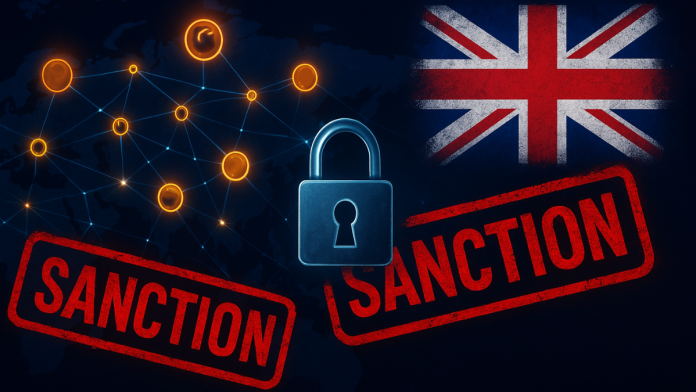The United Kingdom has taken strong action against a huge cryptocurrency network linked to Russia. The UK government claims the network was used to avoid Western sanctions. The crackdown targets banks, crypto exchanges, and individuals allegedly involved in moving billions of dollars through a ruble-backed stablecoin.
$9.3 Billion Ruble-Backed Stablecoin Targeted
Authorities say the network revolves around a $9.3 billion digital currency called A7A5, designed to mirror the Russian ruble on blockchain platforms. This stablecoin allowed transactions worth billions of dollars to move quickly across borders, avoiding the usual banking system.
The UK said the network was a direct attempt to reduce the effect of sanctions imposed on Russia after its invasion of Ukraine. The move follows similar actions by the United States earlier this month. The UK government has more than 2,700 sanctions already in place against Russia.
Pakistan’s crypto pact with Trump venture sparks alarm over money laundering, terror links
Several banks and crypto exchanges have been added to the United Kingdom’s sanctions list. These include Capital Bank of Central Asia and its director Kantemir Chalbayev, who are accused of facilitating transactions that helped Russia bypass international financial restrictions.
Crypto Exchanges and Infrastructure Under Scrutiny
Two cryptocurrency exchanges based in Kyrgyzstan, Grinex and Meer, were also sanctioned. Authorities claim these exchanges were central to the ruble-backed stablecoin network. The exchanges reportedly processed billions in transactions within just a few months.
The UK also sanctioned multiple companies tied to the network’s infrastructure, including Altair Holding, CJSC Tengricoin, Old Vector, and Leonid Shumakov, the director of the A7A5 stablecoin network. UK officials said the measures were designed to prevent Russia from using alternative financial systems to weaken global sanctions.
Crypto mining scam worth $577 million ends with prison for Estonian duo
One of the exchanges involved, Grinex, has connections to Garantex, a previously sanctioned Russian-linked platform. Earlier this year, $27 million in digital assets tied to Garantex was frozen by US authorities for allegedly facilitating illegal transactions. This connection raised red flags for the UK and other Western governments, highlighting the risks of crypto networks being used to bypass sanctions.
How Cryptocurrency Bypasses Sanctions
Cryptocurrencies like stablecoins can move money without using traditional banks, making it easier for sanctioned countries to continue trade. Instead of going through regular financial systems that are closely monitored, transactions occur directly on blockchain networks. These networks record transfers digitally and instantly, making it harder for authorities to track or block funds.
Kyrgyzstan Responds to Sanctions
The sanctions prompted an immediate response from Kyrgyzstan’s president, Sadyr Japarov. He criticized the UK decision, saying that the nation’s banking sector should not be politicized. Japarov emphasized that most banks in Kyrgyzstan do not help Russia evade sanctions.
Russia crypto platforms Garantex and Grinex hit by U.S. sanctions, $27 million frozen
According to Kyrgyz authorities, only the state-owned Keremet Bank is authorized to process transactions in Russian rubles. This bank has been sanctioned in the past by the United States for its role in handling Russian trade payments.
Japarov also stressed that Kyrgyzstan remains committed to following international agreements while protecting local trade and the economy. Officials warned that sanctions could affect the nation’s banking system and financial stability.
Crypto and International Regulations
Western governments are increasingly monitoring stablecoins and cryptocurrency exchanges to prevent misuse. These platforms operate outside normal banks, which makes them a focus for international regulators. Governments argue that proper oversight of crypto networks is essential to ensure that sanctions remain effective and illegal activity is minimized.
The latest United Kingdom’s measures highlight the growing attention on cryptocurrencies as a tool to bypass international sanctions.


